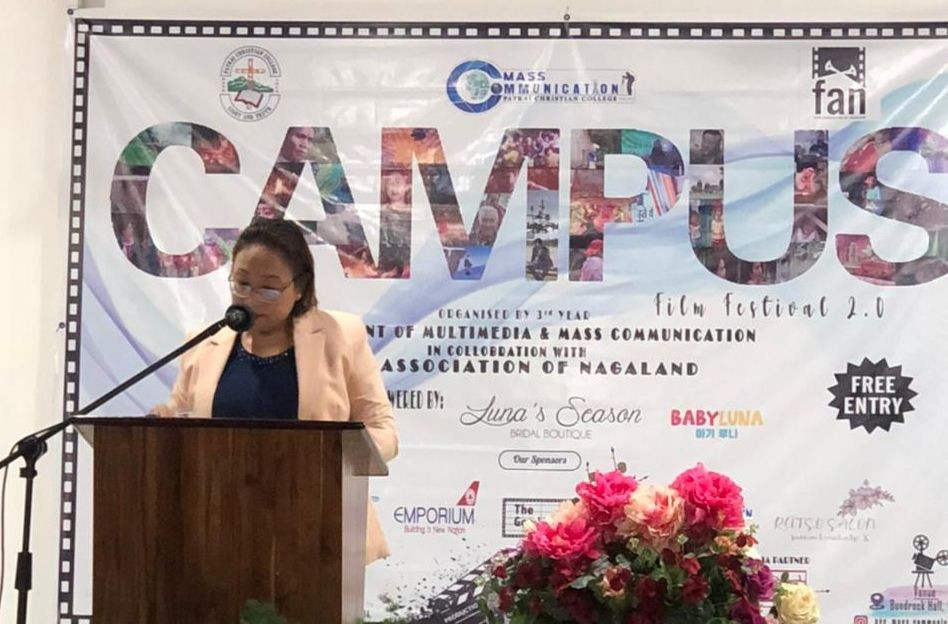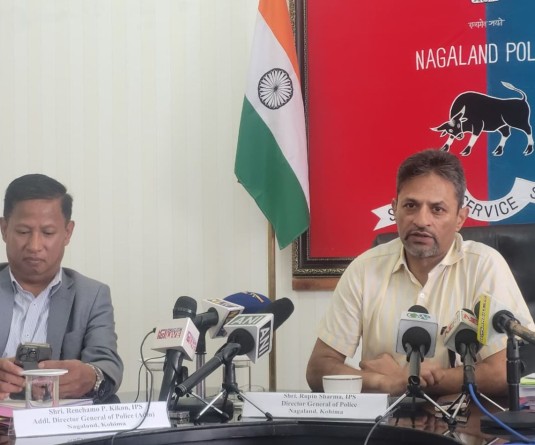Metevinuo Sakhrie, Joint Director, IEC, Nagaland State AIDS Control Society (NSACS) addressing the inaugural function of the ‘3-Day Campus Festival 2.0’ at the Patkai Christian College (Autonomous) on November 1. (Morung Photo)

Morung Express News
Patkai | November 1
In India, young people in the age group of 15-29 years comprise almost 25% of the country's population, however they account for 31% of the AIDS burden, Metevinuo Sakhrie, Joint Director, IEC, Nagaland State AIDS Control Society (NSACS) stated today.
Young people's risk of becoming newly infected with HIV is closely correlated with the age of sexual debut, she added, addressing the inaugural session of the ‘3-Day Campus Festival 2.0’ at the Patkai Christian College (Autonomous), as a special guest on November 1.
Lack of access to correct information, tendency to experiment and an environment which makes discussing issues around sexuality taboo adds to their vulnerability, she said, adding that abstinence and delayed initiation of sexual behaviour are among the central aims of HIV prevention efforts.
Sakhrie further informed that 2021 onwards till 2026, the National AIDS and STD Control Programme Phase 5 has been initiated towards the attainment of the United Nations Sustainable Development Goals 3.3 of ending the HIV and AIDS as a public health threat by 2030.
Phase 5 is being implemented with 5 main goals, she added. These are reducing annual new HIV infections by 80%; reducing AIDS related mortalities by 80%; eliminating vertical transmission of HIV and Syphilis (from mother to child); promoting universal access to quality STI/RTI services to at risk and vulnerable populations (which includes women and youth); and eliminating HIV/AIDS related stigma and discrimination.
To address and eliminate stigma and discrimination, the HIV and AIDS (Prevention and Control) Act 2017 has been enforced all over India since September 2018 and this Act will continue to be the cornerstone of the national and the states response to the HIV and STI, Sakhrie noted.
Among others, under the Act, no protected person (People infected and affected with HIV) can be discriminated, denied, terminated with respect to employment/occupation, healthcare services, public places, educational establishment, right to movement, right to property, opportunity to hold public/private office or access to care and custody in government or private establishments, she added.
Meanwhile, highlighting some works undertaken by the NSACS, the Joint Director informed that as a part of intervention and programme especially designed for the youth, Red Ribbon Clubs have been established in 89 colleges/institutes across Nagaland in coordination with the Department of Higher Education
The Adolescence Education Programme in coordination with the Nagaland Board of School Education has trained teachers across 724 schools, she informed. The Out of School Youth Programme in coordination with the Nehru Yuva Kendra Sangathan has been initiated across 11 districts and 74 youth clubs, she added.
The Quiz competition among Red Ribbon Club members at district, state, regional and national level as well as short film competition under the aegis of the National AIDS Control Organisation for youth of Nagaland are also some interventions, she said.
Meanwhile, Sakhrie appealed and urged the gathering to be responsible youths by getting educated and learn the basics about HIV transmission, testing and prevention. “Get talking... talk with parents, teachers, doctors and other trusted adults about HIV and sexual health,” she said.
She also suggested getting tested for HIV at least once as part of routine health care. “If you test positive for HIV, to get support, seek treatment and stay in care to remain healthy and prevent passing the virus to others,” she added.
Meanwhile, inaugurating the festival, Sakhrie further noted that the film festival is a great platform not just for story-telling but also to use the opportunity to reflect and think about important issues and concerns.




